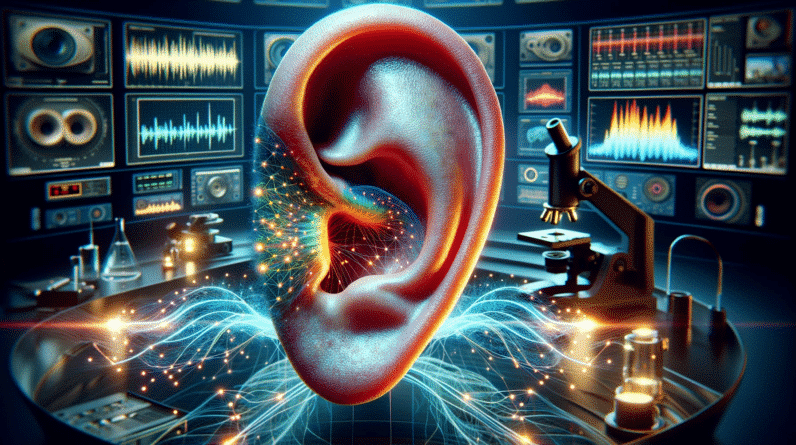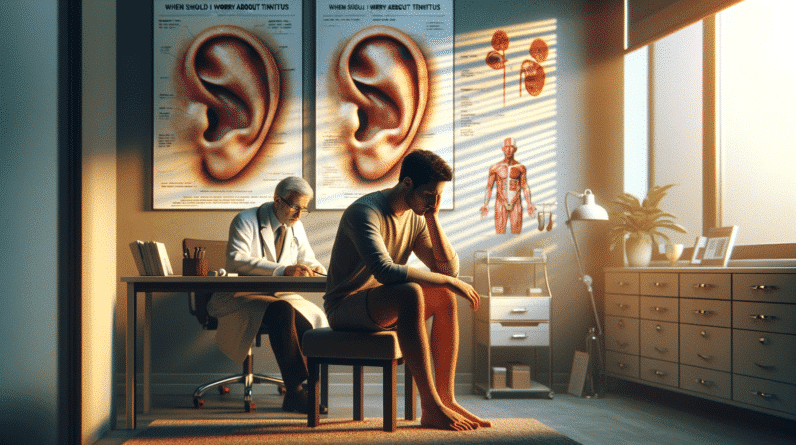
We may earn money or products from the companies mentioned in this post.
As an Amazon Associate I earn from qualifying purchases.
Introduction
Picture this: You’re in a quiet room, and there’s a faint ringing sound — like a buzzing insect — that only you can hear. It’s not coming from any electronic device, and there’s no actual source for the sound. It’s simply there, persistently humming in your ears. This unnerving scenario could be an indication of a condition known as Tinnitus. Now, how can you tell if you have tinnitus? This article aims to provide the answers you seek while emphasizing the significance of early detection and accurate diagnosis.
Understanding Tinnitus
First things first, let’s establish a clear understanding of Tinnitus. Tinnitus, derived from the Latin word ‘tinnire’ – meaning ‘to ring’, is an auditory phenomenon where a person hears noises that aren’t present externally. It’s akin to creating your personal orchestra of sounds. But why is Tinnitus such a widespread issue?
Tinnitus is more common than you might think, with about 15-20% of people set to experience it in their lifetime. These odds are not in our favor, which further emphasizes the importance of early detection and intervention.
Types of Tinnitus
Just as there are different music genres in an orchestra, Tinnitus, likewise, showcases a variety of its own. Let’s delve into the two main types:
Pulsatile Tinnitus
Picture a drumbeat. That’s how Pulsatile Tinnitus sounds. This type is in rhythm with your heartbeat, like a constant companion to your cardiovascular system.
Non-Pulsatile Tinnitus
This type is much more random and persistent. Its variations include ringing, whistling, hissing, or buzzing sounds. These sounds don’t follow any rhyme or rhythm, kind of like free jazz.
Perplexed yet intrigued about Tinnitus? It’s okay to feel that way. With Tinnitus, every individual’s experience varies, just like fingerprints. But if unprompted, these ‘invisible sounds’ can burgeon into something louder and more chronic. Tune in to your body, heed its warnings, and if any red flags appear, get checked as soon as possible.
Stay tuned as we delve deeper into diagnosing Tinnitus in the upcoming sections of this article.
Understanding Tinnitus Symptoms
Now that we have a basic understanding of Tinnitus, it’s crucial to recognize its common earmarks. Symptoms vary greatly among individuals, much like the varying compositions of a symphony. There are, however, persistent, telltale signs that may hint towards Tinnitus.
Persistent ear ringing: This is the quintessential symptom of Tinnitus. It can start as a soft hum, like the distant ringing of a telephone, that gradually becomes more prominent, making it feel like an aggressive, unwelcome soundscape.
Hearing loss: If you find yourself consistently asking people to repeat themselves or turning the volume up on devices, you might want to consider possible hearing issues tied to Tinnitus.
There are other symptoms as well, some of which are available here.
How to Know if You Have Tinnitus
Spotting the red flags is the first step in identifying Tinnitus. Next, it’s crucial to check your symptoms and seek professional help.
Checking your symptoms may feel alarming, but remember, knowledge is power, the ammunition you need to tackle Tinnitus. If you observe any recurrent ear ringing or other unexplained noises, it’s also relevant to discern whether it accompanies other changes such as hearing loss or sudden sensitivity to sound.
Moreover, it’s vital to seek professional help at this stage. Yes, internet research is helpful, but there’s no substitute for a qualified audiologist’s diagnosis. An expert’s analysis will be more comprehensive and reliable—a decisive move in your fight against Tinnitus.
Signs You Have Tinnitus
Apart from persistent ear ringing and hearing loss, there are additional signs that may indicate Tinnitus. These could include:
- A feeling of fullness in the ear
- Difficulty in understanding speech
- Tinnitus that affects your sleep
- The sound becomes so loud that it interferes with your daily activities.
Let’s also discuss some of the risk factors involved and common Tinnitus triggers.
Risk Factors for Tinnitus
The primary risk factor for Tinnitus is prolonged exposure to loud noises, which can lead to noise-induced hearing loss. Other risk factors could include certain medical conditions, medications, and even lifestyle choices.
Tinnitus Triggers
Some common triggers you should be aware of include stress, certain medications, high blood pressure, and dietary choices. By understanding these triggers, you can also take steps to mitigate them and potentially reduce the severity of Tinnitus symptoms.
Ultimately, understanding Tinnitus isn’t just about learning relevant medical terminologies. It’s about attuning to your body’s frequencies, listening for any changes, and then seeking the right help. Now, keep this information in mind, and let’s go deeper into the common causes of Tinnitus in the next section.
Common Causes of Tinnitus
After discerning whether you have Tinnitus and getting acquainted with the red flags, you might be wondering, “What causes this persistent ear orchestra?” Understanding the causes behind Tinnitus is critical to recognizing how its relentless sounds can develop into a more severe, chronic condition if untreated.
Ear Infections: It’s surprising how much havoc a minor ear infection can introduce. Plagued by ear infections? Well, these inflammations might extend beyond simple hearing discomfort, serving as potential ground zero for Tinnitus symptoms. You can learn more about this connection here.
Exposure to Loud Noises: Constant exposure to loud noises can trigger Tinnitus. Yes, even that ear-puncturing construction site noise counts! Preventing noise-induced Tinnitus isn’t always about avoiding rock concerts as much as that contributes, of course.
Age-Related Hearing Loss: Age has its own basket of health-related mixed bags – one of them being hearing loss, an often unavoidable reality for some. As we cross into the realm of ‘the golden years,’ hearing loss becomes more probable, increasing the risk of Tinnitus. Take a look here for more on age-related hearing loss and Tinnitus.
Certain Medications: Hold on to that prescription; some medications can cause or worsen Tinnitus. These typically include certain antibiotics, antidepressants, and high-dose aspirins. Every medication has its side effects, and unfortunately, for some, that manifests as Tinnitus. Rare, but plausible, which is why it’s vital to consider all aspects of your health – even your medication history.
In the symphony of your health and well-being, Tinnitus is a section worth paying close attention to. Remember, early recognition can be key in managing this prognostic orchestra. So, be sure to take the necessary steps should you encounter any signs of Tinnitus. Don’t give it the chance to play the drums to your heartbeat.
Next Steps After Identifying Tinnitus
Pinpointing Tinnitus is like finding the mysterious source playing that persistent symphony in your ears. Once you’ve cracked this riddle, it’s time for the next steps. Remember, catching Tinnitus early can be a lifesaver, minimizing its impact on your quality of life and preventing it from conducting an encore in your ear canals.
Consulting with a Hearing Expert
Okay, you’ve seen the signs and suspect you might have Tinnitus. Don’t hit the panic button yet; it’s time to call in the professionals. Visiting a qualified audiologist should be your next move. They are the superheroes geared up with the right tools and knowledge when it comes to questions like “How? What? When?” of Tinnitus.
Tinnitus Treatment Options
Now that you’ve got a diagnosis, you might be wondering – how do you silence this unwelcomed concert? There’s good news and bad—the bad news: there’s no definitive cure for Tinnitus yet. And the good? There are numerous ways to manage it. Depending on your symphony’s composition, a combination of therapy, medication, and possibly hearing aids, could significantly help reduce the noise. You can explore different treatment options here. Remember, treatment is very individual and what works for one, might not work for another. Your doctor would be the best person to guide you.
Conclusion
The road to discerning Tinnitus might be challenging. You’ve got to tune into subtle signs, understand the difference between Pulsatile and Non-Pulsatile, and gather your courage to seek professional advice. But remember, the moment you spot the signs, swift action can help keep Tinnitus from conducting a crescendo in your life.
Call to Action
Intrigued and want to know more? Visit the [American Tinnitus Association] for more insights. At this junction, we hope you understand the importance of catching Tinnitus early. So, if you suspect Tinnitus is playing a tune in your ears, don’t turn a deaf ear. Turn down the volume by seeking help!
If you think you might have Tinnitus or want to learn more about it, head over to our website for resources and advice. While there, don’t forget to check our comprehensive collection of blogs for everything you need to know about Tinnitus. Happy healing!
How To Know If You Have Tinnitus - Frequently Asked Questions (FAQ)
You can learn more about Tinnitus from [our blog](https://pulsatiletinnitustreatments.com/Understanding-Tinnitus).
Currently, there is no definitive cure for Tinnitus. However, there are numerous ways to manage the symptoms and significantly reduce the impact of Tinnitus on your quality of life. This could include trip specific treatments, therapy or hearing aids. You can read more about the different treatment options [here](https://pulsatiletinnitustreatments.com/tinnitus-treatment-options).
While Tinnitus itself is not dangerous, it could be a symptom of other underlying conditions such as ear injury, cardiovascular disease or hearing loss. It is thus highly recommended to seek medical attention if you suspect you have Tinnitus.
Tinnitus may diminish or go away over time on its own. However, it can sometimes become persistent or chronic. In such cases, it’s important to seek treatment to manage the symptoms. Get more information [here](https://pulsatiletinnitustreatments.com/does-tinnitus-go-away).
Amazon and the Amazon logo are trademarks of Amazon.com, Inc, or its affiliates.
Related posts:
- Unlocking the Secrets of Ear Pain and Ringing: Comprehensive Guide to Causes, Symptoms, and Breakthrough Relief Strategies
- Tinnitus Unmasked: Why Your Ear Has Been Ringing for Hours and How to Silence It
- Ear Ringing and Ear Pain: Your Ultimate Guide to Diagnosis and Treatment
- Unlocking the Power of Hearing Aids for Tinnitus: Your Ultimate Guide to Choosing the Best Tinnitus Hearing Aid






8 Comments